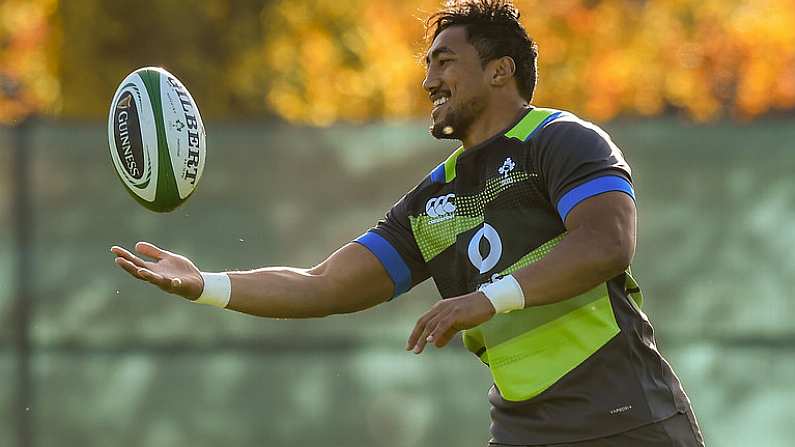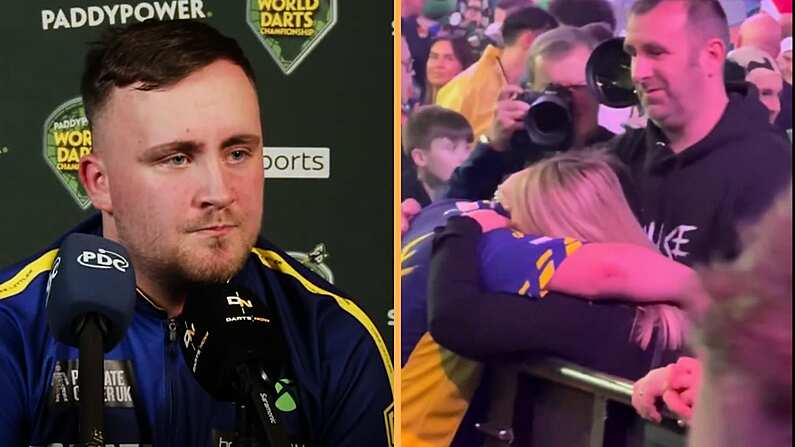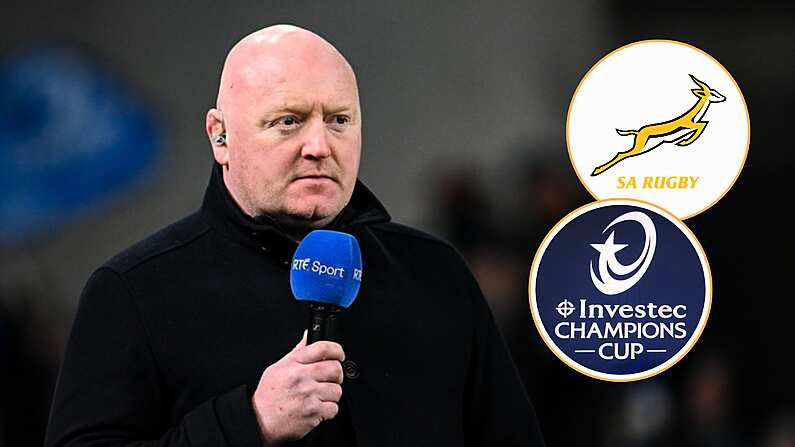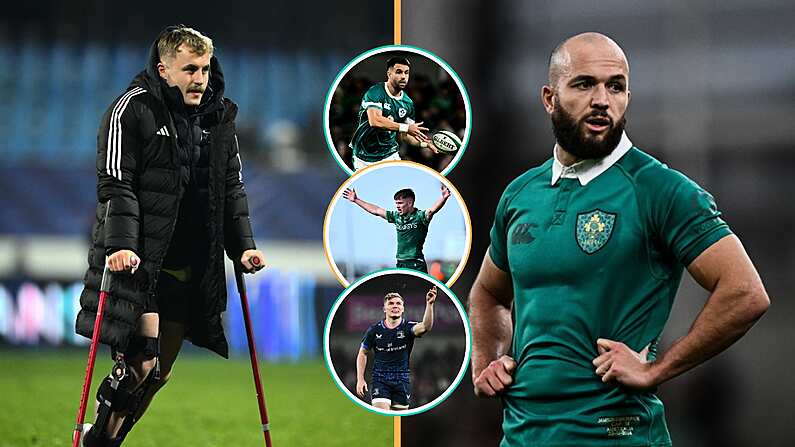Italy has given me a huge amount – they were the first nation to sign up for the goggle trial. I know I’m never going to be 100% Italian – as my name suggests – but Italy is my home and I speak the language fluently. Italy has given me a second opportunity when others wouldn’t and for that I owe them a huge amount.
Ian McKinley in a recent interview with the Guardian
The recent furore over rugby's residency rule has been particularly furious. Bundee Aki's inclusion in the Ireland squad instigated this tested debate once again. It's an argument that extends into every crevasse of the spectrum: A balancing act between the bigot parroting xenophobic vitriol and rational reluctance to see our national team downgraded by opportunistic big-money signings interested in lining out for whatever possible international team.
Former Leinster out-half Ian McKinley is another new benefactor from World Rugby's rule. Today he was named on the bench for Italy's test match against Samoa this weekend.
He too could be accused of blocking the passage of young Italian talent into their national side. McKinley is a fine rugby player, but his talents are not enough to see him oust Sexton and start for Ireland. Italy provides a more likely option.
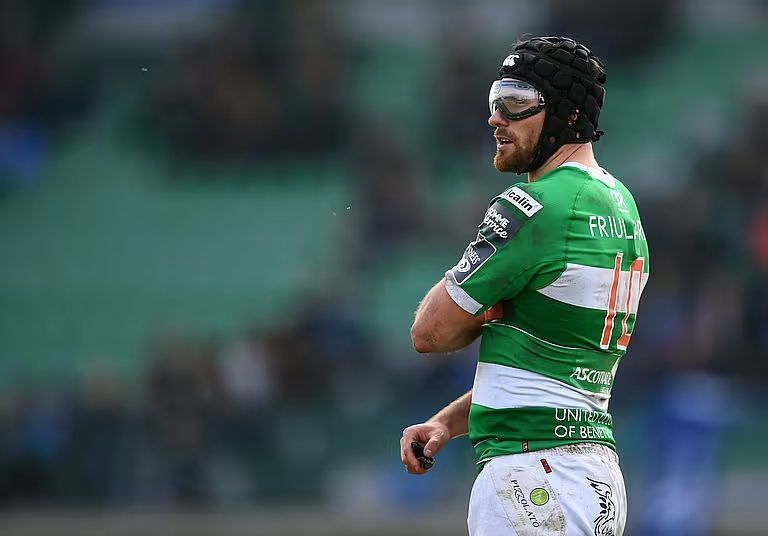
Except McKinley is a significant exception.
In 2014, World Rugby sanctioned a trial of protective googles for those that require them. 24 Rugby unions participated in the study, including seven of the top ten nations. The IRFU did not.
McKinley sustained an eye injury playing rugby. In 2010 when lining out for UCD, a team-mate's boot caught his eye and he was sidelined for six months. 18 months later, while sitting in traffic, his retina detached and his sight in his left eye was gone.
McKinley had made his debut for Leinster prior to the intial injury and returned to play after. During his first comeback his good eye was gouged, twice, by an opponent. When his retina detached, he had no option but to retire.
Then the trial was announced. Italy were a participating country. He went there and played with northern Italian side Viadana in the Eccellenza, was soon signed by Zebre as injury cover and then moved to Benetton Treviso. The IRFU even sent him a letter, in September 2015, to let him no he was not permitted to play in the upcoming game within Ireland against Connacht because he wore protective goggles.
McKinley is a testament to what the residency rule can embody. An individual who adopts a new homeland, outside of the confines of arbitrary, ever-changing borders that imposed themselves on Europe after the disintegration of the Holy Roman Empire. Far from being contrary from the notion of international teams, this is the very point of sport.
Sport should be a vehicle for opportunity. An underdog story. The Italian rugby union afforded him an chance to play rugby and he took it.
*********************
Sene Naoupu is a health-and-fitness coach in Galway. At the end of 2015, she had an idea - a mass-group fitness class incorporating dance and flow. It was all to benefit local charities: ACT for Meningitis, COPE Galway Charity Shop, Irish Heart Foundation, Self Help Africa, and Special Olympics Connacht.
Sene's husband is George, the former Connacht number 8. He joined in 2009, went to Japan for a year and in 2011 returned to Galway with his family. He never played for Ireland and was released by Connacht in 2016.

Working with his wife, he kept himself fit and signed a year long contract with Harlequins in 2016. Upon completion of that deal, he retired and returned to Ireland. Here's what he had to say to Galway Bay FM when announcing his retirement:
My wife and I are excited to return to Ireland and I look forward to continuing work in rugby as a coach, engaging communities, schools and clubs in the country that has been so generous to my rugby career. I now wish to do my part and give back by helping to develop the game from grassroots level and beyond.
When his wife was organising her event to benefit local charities, she looked to George's former teammates in the hope they'd assist with promotion and take part.
That's how Bundee Aki came to show off his dance moves in Leisureland, Salthill's local swimming pool and event hall.

The Naoupus moved to Oranmore, a spot George liked because it was beside the sea. When Aki's family followed him to Galway, Naoupu and other Connacht players' partners helped them get settled.
Naoupu coached local side Galwegians for a year and was occasionally accompanied by Aki to training. After Connacht won the Pro12 in 2016, Aki went with the Connacht team and spoke at Oranmore's local primary, Maree National School.
Inspired by her husband George's success, Sene Naoupu decided to get back playing when they moved to Ireland. It was once the game of her childhood but an eating disorder forced her to quit. She is now a stalwart of the Irish women's team.

Meanwhile, Aki's children started attending school in Galway. As Pat Lam outlined to RTE recently, Aki has embraced Galway.
He chose to commit to the west of Ireland - and that probably shocked a lot of people.
He really fell in love with the place and what it stands for.
It's not a decision he's made lightly, it's because he's thoroughly enjoyed his time in Ireland - and the Irish people love him as well.
There are few, if any, players who will give up significant portions of their career for the sake of a international cap. Under the new residency rules, a five year stay is required. In other words - half a career.
It took 10,000 signatures on a petition and the pointing out that the IRFU's fears around the safety of goggles- after two years of testing across multiple age-grades did not produce a single incident or injury- were demonstrably nonsensical before the IRFU would wilt and allow McKinley play in his country of birth.
Rory Best, the current Irish rugby captain, is a proud Ulster-man. He was awarded an OBE by the queen earlier this year. He opts not to sing the national anthem. Yet his commitment is unquestionable. His conduct both on and off the field makes him an outstanding captain. Would any dare question his merit for inclusion based on 'Irishness'?

International sport has never been a binary experience. Nowhere is that clearer than our own chief-granny-rule exploiting homeland. In football, the conversation never turns to national identity. The Republic of Ireland just want to be competitive.
There is nothing binary about this debate. National identity is merely the product of narrative. But there is no concise rule that can define identity or metric to determine Irishness. This debate is defined by its perplexity. Intellectually, politically, and legally, it is complex. Our sporting entities represent the nation publicly, except in our case, it is two nations. We play two national anthems, one of which, a number of our players don't sing. Our selection pool is not based on nationality but geographical availability. Irishmen abroad are overlooked, foreigners are embraced.
Does the lack of born and bread players dilute the Republic of Ireland team? Does it dilute club GAA to allow players who move to a locality play for that side, or even recently inter-county GAA? Or is it perhaps acceptable to allow individuals who dedicate years to living, working, and dancing within the country the opportunity to don the green jersey.
Sene Naoupu, Ian McKinley, Bundee Aki, they are a testament to the prosperity, not the invalidity, of the residency rule.

